

Talking with Your Doctor - Planning Your Doctor Visit. A Partnership How well you and your doctor talk to each other is one of the most important parts of getting good health care.

Unfortunately, talking with your doctor isn't always easy. In the past, the doctor typically took the lead and the patient followed. Today, a good patient-doctor relationship is a partnership. You and your doctor can work as a team. Creating a basic plan before you go to the doctor can help you make the most of your visit. (Watch the video to get tips on planning for your doctor visit. Make a List of Your Symptoms Talking about your health means sharing information about how you feel. Mental Health Forum.
Being a Parent with Mental Illness. Being a parent can be tough at the best of times, some days it can feel like a constant battle.
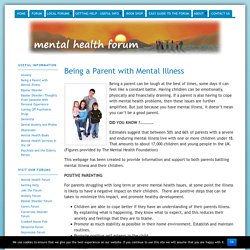
Having children can be emotionally, physically and financially draining. If a parent is also having to cope with mental health problems, then these issues are further amplified. But just because you have mental illness, it doesn’t mean you can’t be a good parent. Estimates suggest that between 50% and 66% of parents with a severe and enduring mental illness live with one or more children under 18. That amounts to about 17,000 children and young people in the UK.
This webpage has been created to provide information and support to both parents battling mental illness and their children. For parents struggling with long term or severe mental health issues, at some point the illness is likely to have a negative impact on their children. Human Needs: The Human Givens Approach To Physical & Emotional Needs. The principles behind the human givens approach grew out of the work of a group of psychologists and psychotherapists who were trying to bring greater clarity to the way people who become depressed, anxious, traumatised or addicted are helped, as well as making such help more reliably effective (read more).

THE HUMAN GIVENS APPROACH is a set of organising ideas that provides a holistic, scientific framework for understanding the way that individuals and society work. I Don't Dream? Yes You Do. Why We Have Nightmares & Forget Our Dreams. Joe Griffin explains why dreaming and forgetting our dreams, fulfils a vital human need.
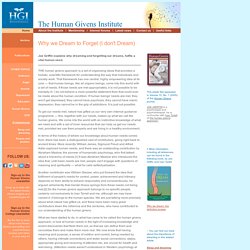
THE human givens approach is a set of organising ideas that provides a holistic, scientific framework for understanding the way that individuals and society work. That framework has one central, highly empowering idea at its core — that human beings, like all organic beings, come into this world with a set of needs. If those needs are met appropriately, it is not possible to be mentally ill. I do not believe a more powerful statement than that could ever be made about the human condition. If human beings' needs are met, they won't get depressed; they cannot have psychosis; they cannot have manic depression; they cannot be in the grip of addictions.
To get our needs met, nature has gifted us our very own internal guidance programme — this, together with our needs, makes up what we call the human givens. Sufism and Psychiatry. Arthur J.
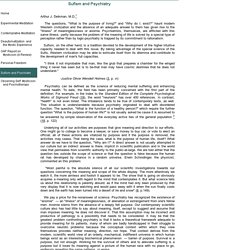
Deikman, M.D.1 The questions, "What is the purpose of living? " and "Why do I. exist? " haunt modern Western civilization and the absence of an adequate answer to them has given rise to the "illness" of meaninglessness or anomie. Observing Self: Mysticism and Psychotherapy. Psychotherapy arose in response to human suffering, and, as far as we can tell, human suffering has always existed.
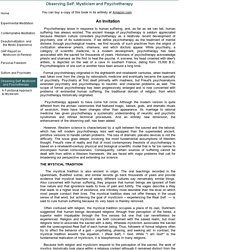
The ancient lineage of psychotherapy is seldom appreciated because Western culture considers psychotherapy as a relatively recent development of psychiatry, one of its subdivisions. If we define psychotherapy as the treatment of mental distress through psychological means, we find records of such practices from the origins of civilization whenever priests, shamans, and witch doctors appear. Enagic Kangen. Most Excellent Sites. AE. How to Grow Close By Asking the Right Questions. 36 questions to build intimacy… These questions only take about 45 minutes to discuss.
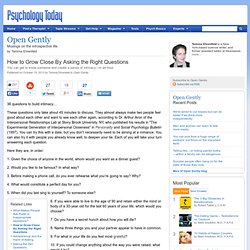
They almost always make two people feel good about each other and want to see each other again, according to Dr. Arthur Aron of the Interpersonal Relationships Lab at Stony Brook University, NY, who published his results in "The Experimental Generation of Interpersonal Closeness" in Personality and Social Psychology Bulletin (1997). What playfulness can do for you. Edwin de Vos and Dieter Reuther suggested the following interesting article from the Boston Globe, written by Leon Neyfakh.
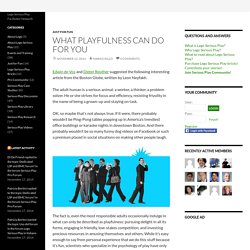
The adult human is a serious animal: a worker, a thinker, a problem solver. He or she strives for focus and efficiency, resisting frivolity in the name of being a grown-up and staying on task. OK, so maybe that’s not always true. If it were, there probably wouldn’t be Ping-Pong tables popping up in America’s trendiest office buildings or karaoke nights in downtown Boston. And there probably wouldn’t be so many funny dog videos on Facebook or such a premium placed in social situations on making other people laugh.
The fact is, even the most responsible adults occasionally indulge in what can only be described as playfulness: pursuing delight in all its forms, engaging in friendly, low-stakes competition, and investing precious resources in amusing themselves and others. It’s clear that playful people have a better time. Kundalinicare. Guide to Developing a WRAP � Wellness Recovery Action Plan. WRAP.pdf. Wellness Recovery Action Plan: Mary Ellen Copeland: 9780963136619: Amazon.com: Books. My Wellness Recovery Action Plan (WRAP) - Login.